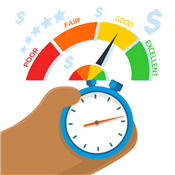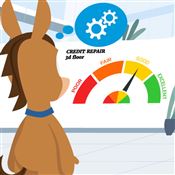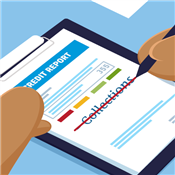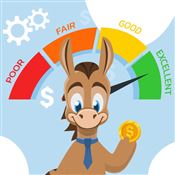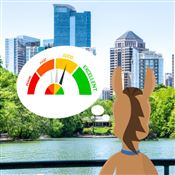How to Remove Late Payments from Credit Report
Late payments can set back your credit score more than 100 points. Don't let it worsen your credit. Learn how to remove it from your credit report.
 |
Deadlines follow you in your finances. Your credit card balance has a due date. Mortgage payments alert you every month.
Be warned: One late payment can drop your credit score by over 100 points. Worse, it's one of the most difficult derogatory items to remove.
In this guide, learn proven ways to take late payments off your credit report, and some tips to avoid it from happening.
What Is A Late Payment?
A late payment is a negative item on your credit report. When you fail to pay on time, it will negatively impact your score. And, your lenders may charge you late fees on top of the monthly interest.
Your credit score drops when lenders report late payments to credit bureaus. This is why it's important to strictly monitor your payments and settle your dues on time.
But in reality, a lot of things may happen that can hinder you from paying on time. Read on and find the best ways to remove late payments from your reports.
How To Remove Late Payments
Removing late payments may sound simple, but it's not easy. First, it doesn't guarantee an immediate increase in your score. Second, you need to create compelling cases to remove your late payment.
But here are ways to get late payments off your credit report.
Free Online Credit Assessment
- Free Credit Score
- Free Credit Report Summary
- Free Credit Recommendation
- 5 Minutes to Check Your Credit
Write A Goodwill Letter For Late Payment
Write a goodwill letter requesting your lender to remove late payments from your credit report. Your goal is to explain your situation and ask for consideration.
Goodwill letters are great examples of showing initiative. It won't hurt to send one to your lender. Some lenders honor it, grant goodwill adjustments, and remove your late payment out of courtesy.
Do note that your lenders are not required to honor your request. But it's a good way to show that you care about your credit and you are willing to build a better payment history.
[Date]
[Creditor]
[Creditor's Address]
Re: Account Number: [Account number]
Dear [Creditor],
Thank you for taking the time to read my letter and considering my goodwill request.
I recently reviewed my credit reports and discovered that I have a late payment reported on [date item was reported] from my [name of account]. I humbly ask you to remove it.
I've had a great experience with you since [year account was opened]. Before my late payment, I had an excellent track record of paying my dues on time. I know that I need to make timely payments on my [name of account], and I will stay on top of my payments moving forward.
I made a late payment because of [situation of your financial hardship or unexpected change in circumstance resulting into a late payment]. This won't happen again.
I've taken some steps to address my current situation. These are some things I did to ensure that I won't get late payment again:
[List down things you did to improve your credit reports]
I'm hoping to [state what you will do: apply for a loan/credit card, refinance mortgage, consolidate other debts, etc]. My recent late payment may disqualify me. I am committed to paying back what I owe, and I would be incredibly grateful for any goodwill adjustment for my late payment on [date item was reported].
I'm hoping for your understanding and consideration.
Kind regards,
[Your name]
[Your address]
When to write a goodwill letter:
A goodwill letter is ideal if you rarely make late payments. If you have a long, positive credit history with only one or two late payments, there's a better chance of a goodwill letter working. Your lender may overlook your late payments.
Goodwill letters work best with small lenders and billers, such as your utility bills or phone bills. In general, big lenders like banks do report credit information to credit bureaus.
Send A Pay-For-Delete Letter To Lender
A pay-for-delete letter works like a goodwill letter. The difference is this: A pay-for-delete letter is a negotiation tool. You are negotiating with your lender to remove the late payment.
What usually happens is you will settle your late payments. In exchange, the lenders will remove the negative item from your report. But like goodwill letters, lenders are not obligated to honor pay-for-delete requests even if you pay your outstanding loans.
Most creditors, especially big institutions like your banks and credit unions, often don't accept pay-for-delete letters. Most major banks do report to credit bureaus but they are not legally required to do so. But it won't hurt your chances to try sending one.
[Date]
[Creditor]
[Creditor's Address]
Re: Account Number: [Account number]
Dear [Creditor],
I hope this letter finds you well. I am reaching out to you about [Account number].
While I do not acknowledge responsibility for the ownership of the debt and its liability, I am committed to resolving this matter amicably.
I would like to offer a settlement for the outstanding balance in exchange for the removal of this account from all credit reporting agencies. Specifically, I propose the following terms:
- You agree to accept the payment as a settlement of the debt for [Account number]
- You agree not to list this account as a paid collection or a late payment
- You agree to remove the debt from all credit reporting agencies
- You agree to delete this debt from your records
- You will not mention this debt or settlement to any third parties hereafter
I am willing to settle the debt for [amount of payment or full balance] in exchange for your written confirmation of agreement of the terms above.
Please respond by [date requested] with a written confirmation if we can proceed with this arrangement. If I don't hear from you by this date, I'll assume you have declined my offer.
Thank you for your time and consideration. I'm hoping for a positive response.
[Your name]
[Your address]
[Contact number]
When to use a pay-for-delete letter:
A pay-for-delete letter is one way to come to an agreement with your lender. If you send a pay-for-delete letter, make sure you can pay off what you owe. Lenders typically give only a couple of days for you to settle your loan if you agree to a pay-for-deletion.
Make sure to get everything in writing when you and your lender agree to the pay-for-delete letter. With proper documentation, you have the support and evidence you'll need to prove that the lender agreed to the arrangement.
Talk And Negotiate With Lender
Talk to your lender personally and explain your situation. Your lenders are still human. It doesn't hurt to have a conversation and try to settle your late payment—rather than let it reflect straight on your credit report.
Search for your lender's listed phone numbers and make a call. Talk professionally and calmly. Basically, what you write in goodwill or pay-for-delete letters, you are verbalizing in real-time.
Lenders don't need to agree to remove your late payment. But calling demonstrates initiative and effort from your end. And it shows you are willing to maintain a good relationship with them.
When to talk to your lenders:
A good conversation and agreement with your lender can minimize the effect of late payments. Some lenders are understanding, especially if you don't have any history of delinquent payments.
"An 'accommodation' includes any payment assistance or relief granted to a consumer who is affected by the COVID-19 pandemic during the period from January 31, 2020, until 120 days after the termination of the COVID-19 national emergency declared by the President on March 13, 2020 under the National Emergencies Act. Such an accommodation includes, for example, agreements to defer one or more payments, make a partial payment, forbear any delinquent amounts, or modify a loan or contract." — Consumer Financial Protection Bureau
Imagine Living Life Without Debt
- Get a free savings estimate today
- See how quickly you can be debt free
- No upfront fees and no obligation
File A Dispute For Inaccurate Late Payment
Lenders can make mistakes. They can report the wrong dates. Or they may have recorded wrong details, leading to late payments or reported transactions that are not yours.
In these scenarios, it's best to file a dispute with your credit bureaus. You might be unaware of the errors reported. So you will probably only see them once you get your credit report or notice changes in your credit score.
As a consumer, you have the right to file a dispute with the three main credit bureaus. If you need to file a dispute, credit bureaus have dedicated web pages for dispute submissions.
- File a dispute with Equifax
- File a dispute with Experian
- File a dispute with TransUnion
[Date]
[Credit bureau]
[Credit bureau's address]
Re: Section 609 of the Fair Credit Reporting Act; Account Number: [Account number]
Dear [Credit bureau],
I hope this letter finds you well. I am reaching out to you to exercise my right under Section 609 of the Fair Credit Reporting Act, and request information on a late payment on my credit report.
The item in question is [Account number] with [Creditor], reported on [Date reported/date associated with the item in dispute].
I want to request an investigation for that late payment on my [Credit bureau] credit report. [Explanation of dispute: I settled the stated balance on time last (Date of payment) compared to the date reported/The reported late payment doesn't belong to me/The late payment occurred more than seven years ago].
I have inserted my current [Credit bureau] credit report, [Other supporting documents like billing statement, statement of account, receipt of payment, etc.], and [Proof of identity: Driver's license/Birth Certificate/SSN].
Please investigate the item in question and send me an updated copy of my credit report once the investigation is complete.
Thank you for your time and consideration.
[Your name]
[Your address]
[Contact number]
When to file a dispute:
File a dispute if the late payment isn't yours OR if you actually paid on time. Make sure to deal with these errors urgently. Credit bureaus have allotted timelines to investigate your transactions.
"Consumer reporting agencies must correct or delete inaccurate, incomplete, or unverifiable information. Inaccurate, incomplete, or unverifiable information must be removed or corrected, usually within 30 days. However, a consumer reporting agency may continue to report information it has verified as accurate."
Hire A Credit Repair Company
Credit repair companies are businesses that help restore your credit. They have professionals, like counselors, lawyers, and certified credit specialists, who know the ins and outs of credit.
Credit repair professionals also know some aggressive methods to help you with late payments. However, you might spend big money on their services.
The benefit is this: You will have experienced people repairing your credit on your behalf. It's an advantage if you are not confident enough about the technicalities of credit repair and credit laws.
When to hire a credit repair company:
If you don't have the time or expertise to handle late payments directly with your lender, credit repair companies can do it for you. Find companies that specifically feature creditor interventions on top of credit bureau challenges.
Read about the most aggressive credit repair company that can help you with late payment records.
Free Online Credit Assessment
- Free Credit Score
- Free Credit Report Summary
- Free Credit Recommendation
- 5 Minutes to Check Your Credit
Get Free Consultation From Experts
- Challenges to three credit bureaus
- Score Analysis and Tracker
- 90-Day Money-back Guarantee
- No first work fee for additional family member
Get a Free Consultation Today
- Plans start at $69/month and $119 first work fee
- 60 day money back guarantee
- Cancel service anytime
- Free Credit Monitoring
Get Started on Your Credit Repair
- No charges for the first 6 days
- 90-day guarantee
- 45-day dispute cycle
- Cancel service anytime
Wait For Late Payment To Disappear
When you're in a tough situation, it's hard to keep your payments on time. A missed payment becomes a late payment, even if you pay only one day past your due date.
Sometimes, the worst happens, and you can't afford to pay off your debts for years. At that point, it's more practical to simply wait.
Late payments can remain for up to seven years on your credit report. If you have one that's a couple of years old, it may make more sense to wait until credit bureaus delete it from your report.
When to wait for late payments to disappear:
Do this as a last resort if you've exhausted everything. There's a saying, "time heals all wounds" and it also applies to your credit. If it's more economical for you to wait, then wait it out. Your late payments won't stay on your credit for eternity.
A missed payment occurs when you don't pay a bill by the due date. In worst-case scenarios, several missed payments put your account into default. Meaning, you've missed several due dates and lenders have no choice but to sell your debt and put your balance in a collections account.
How Late Payments Affect Your Credit
Late payments can seriously impact your credit. Lenders usually report late payments when they are AT LEAST 30 days past due.[1]
How do late payments affect your credit?
- Drop in credit score
Payment history comprises 35% of your credit score.[2] The moment you pay past the due date and lenders report it, that affects your score instantly.Your credit score can also drop if you have a late payment that isn't yours. You should always monitor your credit because identity theft happens a lot. Don't wait for late payments that aren't yours to ruin your credit score.
- Additional fees and charges
You will incur penalties for your late payments. It's a consequence of not following due dates or not making minimum payment for your credit card bill or credit accounts.Note that these additional fees are different from the monthly interest charges you need to pay.
- Repossession of belongings
When you apply for a loan and use collateral for security, your lender can claim them to settle your late payments.For example, homebuyers who can't keep up with mortgages can have their homes repossessed. Vehicles used as collateral can be repossessed if you end up with late payments.
Negative items can stay from 2 to 10 years. Hard inquiries can stay for 2 years, and a Chapter 7 Bankruptcy and tax lien can stay in your report for up to a decade.
Acceptable Reasons for Late Payments on Credit Report
There are several reasons why you could get late payments, such as:
- "I didn't receive the statement."
Sometimes clients and customers don't receive their billing statements due to a change of address or postal delays. Make sure to update your address with your creditors promptly. - "I've already paid the balance due."
Payments may be made on time, but processing delays can cause them to be recorded late. A late payment may be reported if your creditor reports to the credit reporting agencies before your payment is processed. - "I'm having issues with the payment options."
Technical problems with websites, apps, or payment options can lead to delays. Always keep a copy of your correspondence with your creditor if you need to dispute a late payment. - "There are errors in my statement."
Sometimes you might receive incorrect charges or balances that aren't yours. Contact your creditor immediately to clarify these errors before the due date. - "I'm having difficulty making the payment."
Life happens. Emergencies or unexpected expenses can make it hard to pay on time. Review your options and rights as a consumer for assistance, and communicate with your creditors to find a solution.
To avoid late payments, communicate with your creditors before your balance is due. This allows you to negotiate arrangements or find alternative solutions and avoid a late payment.
Can you remove accurate late payments?
Typically, you can't remove an accurate late payment. The only time the late payments stop becoming part of your credit reports is when it's way past the reporting period — which is 7 years.
If you are under valid circumstances, such as national emergencies or natural disasters, and you've made payments for your due, you can try sending a goodwill letter to your creditors.
The next best thing you can do is to pay on time the next month and keep building a better payment history to make up for your negative items. That way, the impact of your late payments on your credit scores will go down.
Tips For Avoiding Late Payments
There are many ways to avoid late payments in your report. But the best way is to pay on time. Here are a few tips to stay on top of your monthly dues:
- Set up auto-payments
If you pay a lot of expenses monthly, chances are you are having a hard time managing them. One key trick is to set up as many auto-payments as possible.Link a common account where your lenders can charge your bills. Also, make it a habit to schedule auto-payments a few days before the due date to give each biller or lender processing time.
- Put monthly alerts in your calendar
If you don't want to use auto-payment features, set monthly reminders in your calendar. Calendar apps can display live notifications on your phone for your bills and payments.Keep these alerts on repeat every month so you don't need to set them manually. Best to set reminders of your monthly dues before the due date.
- Prioritize your bills and payments
One of the oldest tips in the book is to prioritize your bills by the due date. Try to allot a portion of your monthly budget to settle them. Your budget can tighten from monthly responsibilities and expenses.It's best if you work out a system and a schedule to keep all your payments on track.
Bottom Line
Late payments can tarnish your credit report for years. Ideally, your best action is to avoid it by settling dues on time! However, the reality is different and you may find it hard to pay on time.
Try getting in touch with your lender through phone calls and letters, or hire professionals to help you. In the worst-case scenario, wait for your late payments to disappear from your credit reports over the years.
References
- ^ Equifax. When Does a Late Credit Card Payment Show Up on Credit Reports?, Retrieved 01/16/2025
- ^ Wells Fargo. How your credit score is calculated, Retrieved 01/16/2025
- ^ CFPB. How long does negative information remain on my credit report?, Retrieved 01/16/2025
Write to Alex Mambaje at feedback@creditdonkey.com. Follow us on Twitter and Facebook for our latest posts.
Note: This website is made possible through financial relationships with some of the products and services mentioned on this site. We may receive compensation if you shop through links in our content. You do not have to use our links, but you help support CreditDonkey if you do.
|
|
| ||||||
|
|
|





